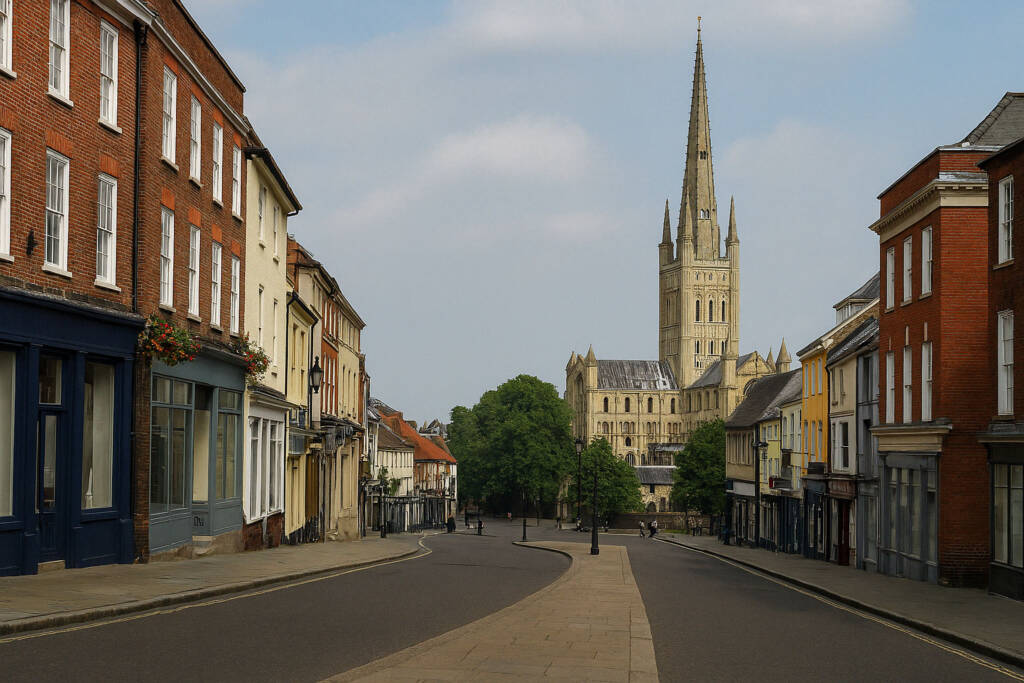Your website is often the first impression people get of your business. It’s your digital shop window. If it’s slow, hard to navigate, or just plain ugly, your potential customers won’t stick around. So choosing the right web design agency isn’t just a nice-to-have—it’s essential.
But with so many web designers and agencies in Norwich, how do you know who to trust? What separates the professionals from the amateurs? And how can you be sure you’ll get real value for your money?
Let’s break it down.
What Are Your Goals?
Before even looking at agencies, ask yourself:
What do I need this website to do?
Do I want to sell products? Generate leads? Showcase work?
Is it mainly for desktop users or mobile?
Do I need help with content, branding, or SEO?
Agencies vary in their specialities. Some are eCommerce experts. Others are brilliant with service-based businesses. Defining your goals early means you’ll know which agency fits best.
Example:
If you’re a local Norwich café looking to attract foot traffic, your site needs fast loading, mobile-first design, and local SEO. But if you run an online gift shop, you’ll need an agency with proven eCommerce experience, like integrating Shopify or WooCommerce.
Check Their Portfolio—But Dig Deeper
It’s easy to be wowed by sleek mock-ups. But looks aren’t everything. When checking a web design portfolio:
Visit live websites, not just screenshots.
Test how fast they load.
See how they look on mobile.
Check if key actions (like contact forms or checkout) are smooth and intuitive.
Red flag:
All the sites look the same. This may mean the agency uses the same template repeatedly, without tailoring the site to the client’s needs.
Green flag:
Each site is different, clearly aligned with the client’s brand and audience.
Ask About Their Process
A good web design agency will have a clear, structured process. If they can’t explain how they take a site from idea to launch, walk away.
Here’s what a solid process should include:
Discovery – Understanding your business, goals, audience.
Planning – Creating a sitemap, wireframes, and timelines.
Design – Crafting visuals that align with your brand.
Development – Building the site using clean, scalable code.
Testing – Checking compatibility, speed, and bugs.
Launch & Support – Making the site live and offering maintenance.
Question to ask:
How do you keep clients involved during the design process?
If their answer is vague or overly technical, be cautious.
Are They Local for a Reason?
Many agencies market themselves as “Norwich-based”—but are they really involved in the local community?
Local agencies can offer:
In-person meetings (especially useful for bigger projects).
Insight into Norwich’s market and business scene.
Better accountability—reputation matters more in a smaller city.
Try this:
Check if they’ve worked with other Norwich-based businesses. Do those businesses recommend them? A quick LinkedIn search can reveal mutual connections or reviews.
Don’t Skip the Testimonials—But Verify Them
Testimonials on a website are easy to fake. Always:
Look for named testimonials with company info and a photo.
Cross-reference with Google or Clutch reviews.
Ask if you can speak to a past client directly.
Pro tip:
Ask for a testimonial from a failed project. Good agencies learn from mistakes and don’t hide them.
Pricing: What’s the Real Cost?
Cheap websites aren’t always a bargain. If you pay £500, you might get a generic template with poor support. But paying £5,000 doesn’t guarantee quality either.
Instead of fixating on price:
Ask for a detailed breakdown.
Clarify what’s included (hosting, maintenance, SEO, revisions).
Ask about future costs (like updates or changes).
Example question:
What happens if I want to update the website myself later?
If they lock you into expensive ongoing fees, that’s a warning sign.
What’s Their Tech Stack?
Your site needs to be future-proof. Ask what platforms and tools they use.
Look for agencies that:
Use WordPress, Webflow, or Shopify—platforms with strong community support.
Avoid hard-coding everything unless truly necessary.
Offer training or support post-launch.
Be wary of:
Agencies that use obscure, proprietary platforms. If they disappear, you might be stuck with a site you can’t manage or move.
SEO and Performance Matter—A Lot
A beautiful site is useless if no one sees it. Ask:
Do you optimise sites for Google?
Will the site be fast on mobile?
Do you use image compression and caching?
Real stat:
According to Google, 53% of mobile users leave a site that takes longer than 3 seconds to load.
If an agency can’t show basic SEO and speed practices, they’re not serious about performance.
Ongoing Support: Will They Be There After Launch?
Websites aren’t one-and-done projects. You’ll need updates, new content, maybe even design changes.
Ask about:
Maintenance plans.
Support response times.
What’s included (backups, security updates, bug fixes).
Watch out for:
Agencies that disappear after launch or charge absurd rates for minor tweaks.
Better option:
Look for those offering flexible support packages or clear hourly rates.
How Do They Communicate?
Good communication is half the battle. You’ll be working with this agency for weeks—maybe months.
Ask yourself:
Are they responsive to emails or calls?
Do they explain things clearly?
Do they listen to your needs, or push their own ideas?
Tip:
If you feel talked down to or confused during early calls, expect that to continue.
Are They Creatively Curious?
Web design is half art, half science. The best agencies stay up to date with trends, but never blindly follow them and should know how to create engaging web design.
Ask:
How do you stay inspired or learn new techniques?
What’s a recent project you’re proud of and why?
You want people who love what they do. That passion leads to better outcomes.
The Red Flag Checklist
Here’s a quick-fire list of warning signs to avoid:
No contract or scope of work.
Vague deadlines and costs.
Refusing to give client references.
Sites they’ve built don’t load well on mobile.
Poor grammar or outdated design on their own website.
Hard selling and pressure tactics.
Agencies to Watch in Norwich
While we can’t play favourites, here are some types of agencies you might come across:
Boutique studios – Often small teams with strong creative vision. Great for custom, design-led projects.
Digital marketing firms – Offer web design as part of a wider package (SEO, PPC, etc.).
Freelancers – More affordable and personal, but may lack capacity for large projects.
Larger agencies – Good for complex or ongoing needs, but sometimes slower and more expensive.
Look at the fit, not just the name.
So, What’s the Best Web Design Agency in Norwich?
There’s no one-size-fits-all answer. The best agency for you is the one that:
Understands your business.
Communicates clearly and regularly.
Builds sites that perform, not just look good.
Offers fair, transparent pricing.
Genuinely wants your website to succeed.
Take your time. Ask questions. Trust your gut.
Your website is your digital handshake. Make sure it’s built by someone who knows what they’re doing—and cares about doing it right just just us here at Design Vibe Creative. If you would like to discuss your web design project the please contact us.



